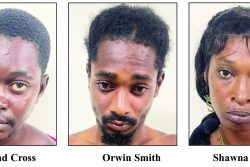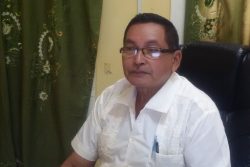There is a certain country in the world which has fallen under the control of armed criminals. That is to say it has been taken hostage by gangs engaged in kidnapping, rape and murder while the state sits impotent, having surrendered jurisdiction. That country is not located on another continent or is the bearer of a name none of us has ever heard of; it is a member of Caricom, although not always thought of in those terms. Haiti, the nation at issue, has been cursed by endless adversity in the course of its history, much of it foreign inflicted, but it has now arguably reached its nadir.
In a remarkable documentary the BBC has recently chronicled the utterly dire situation in which Haitian citizens find themselves, particularly those living in Port-au-Prince. The media house reported that armed gangs controlled at least 60% of the capital and its environs, and that they also controlled access to and egress from the city. Parliament cannot meet because the gangs control the area around the building, and Prime Minister Ariel Henry can’t go into his office for the same reason.
The BBC’s Chief International Reporter Orla Guerin described how those who lived in Haiti’s largest city had to have a mental map in their heads, dividing it into green, yellow and red zones. Green meant an area was gang free, yellow could be safe today but dangerous tomorrow, and red was a no-go sector. The green part, she said, was diminishing as the gangs tightened their hold. In an independent account local sources were reported as saying that armed groups were expanding their territory because elections were overdue, and that when politicians came looking for votes they had to pay off the gunmen in gang-held areas.
According to the UN between January and June of this year almost 1,000 people were killed by the gangs, while according to Haiti’s National Human Rights Defence Network between June and September of this year 1,377 people were killed, injured or disappeared. The BBC described kidnapping as a growth industry, with 1,107 people kidnapped between January and October 2022, and the dangerous times as being the morning and evening rush hours. For some gangs it’s a major source of income, and while most victims will return alive as long as the ransom is paid, they are made to suffer.
Gedeon Jean of Haiti’s Centre for Analysis and Research in Human Rights was quoted as saying, “Men are beaten and burned with materials like melted plastic,” while “women and girls are subject to gang rape. This situation spurs relatives to find money to pay the ransom. Sometimes kidnappers call the relatives so they can hear the rape being carried out on the phone.”
Gangs use rape now as a weapon targeting women and children (and these are ordinary citizens) who happen to live in zones controlled by their rivals. Citing civil society campaigners there have been reports that in July during a battle over turf in Cité Soleil, the capital’s poorest sector, more than 300 people were murdered and their bodies burnt, and at least 50 women and girls gang-raped.
The interviews of some victims by Ms Guerin were hard to watch. To provide just one example there was the man whose identity was obscured for his own protection who related how in one of these gang invasions his wife had hidden him under the bed with clothes piled on top of him, and his nephew had hidden in the wardrobe. When the gang members burst in, his nephew ran out of the wardrobe and they killed him, because they always kill young men when they go into an area. While the interviewee lay under the bed he had to listen to his wife being gang-raped without being able to do anything about it. His face could not be seen while relating this harrowing experience, but the sound of his weeping could be distinctly heard at the end.
In a Diaspora column we carried two months ago human rights activists were reported as describing a situation where there was no punishment for the crimes that were being committed. “There are no prosecutions,” Marie Rosy Auguste Ducena was quoted as saying, “Judges don’t want to work on these cases. They are paid off by the gangs. And some police are like a support system for the gangs, giving them armoured cars and tear gas.”
Where the police are concerned Mr Jean added: “We know cars with police licence plates are used for kidnappings. Whether the police as an institution is involved, we don’t know.” However, he went on to say, “We know that there are at least two serving or former policemen, in every gang.” The caveat is that some police will live in gang-controlled areas and will have no choice about helping the gang.
And then there is the matter of the relationship between politicians and certain gangs whom the BBC reported were both in the government and opposition. It was said they supplied them with weapons or finance or political protection, and in return the gangs did their “dirty work”.
“There have always been relationships between politicians and some gangs, located mainly in poor neighbourhoods with high electorates. But since the election in 2011 those relationships have become institutionalised,” James Boyard, a security expert, and professor, was quoted as saying. “They [the gangs] are used as subcontractors to create political violence.” If a gang member is arrested then a phone call from a backer can get him released – with his guns. The BBC also reported that some businessmen gave backing to gangs, although now it has been suggested by other sources that the business community wanted them reined in.
The two main gang coalitions are G9 and G-Pep, the first-named of which had ties to Haiti’s assassinated president, and is led by a notorious character nicknamed ‘Barbecue’, who blockaded the country’s main fuel terminal for two months causing a humanitarian crisis. In addition to the current disaster caused by the gangs, the cholera introduced by Nepalese UN peacekeepers during the period 2004-2017 has now returned.
The question is, what is to be done? Prime Minister Henry has asked for a foreign force to come, but the UN is not entertaining it after the catastrophe of its last intervention which in addition to cholera and incidents of sexual abuse, made no impact on the gangs. There is talk of a non-UN body, but there has been no agreement on that front either. A short-term intervention will not solve the problem, and experience has shown that a long-term intervention cannot succeed.
Haitian human rights activists are opposed to the idea, while Reuters reported a group of Haitian intellectuals and activists called the Montana Accord as describing Henry’s request as an act of treason, and that foreign troops would only make things worse. Instead, it said, the country needed support for its police force – not all of whom are corrupt, it might be added.
Henry is extremely unpopular on the streets, and is seen by most as illegally in office. In the Diaspora column there are also allegations about his connections to those responsible for the assassination of President Jovenel Moïse, and his obstruction of the investigations. The authors of this column − Charlier, Filippova and Ricker – were of the eminently defensible view that the political issue has to be solved first before the gang violence can be addressed, and that there has to be agreement on a legitimate transitional administration. Furthermore they argue, the US in particular has to withdraw its support for Henry.
On the subject of restoring some small element of the rule of law, they also say that the assassination of President Moïse has to be properly investigated.
In other ways international actors have, however, begun to do things which are critical to the situation, more especially impose sanctions on the backers of the gangs. The US and Canada have begun to sanction the politicians, such as former President Martelly and three prime ministers, as well as the sitting President of the Senate Joseph Lambert. That needs to be extended. In a rare case of unanimity the Security Council banned the export of guns to Haiti. The problem is that most of these originate from the US and many are funnelled in through the Dominican Republic, but Washington has not as yet done what is necessary to enforce this resolution. That certainly needs to change.
And what about Caricom? It can do nothing about gangs, and it has already condemned these, but it can push for Haitians to be allowed to create a transitional political framework which has legitimacy, and would allow them to decide how to deal with their overwhelming problems. Solutions which are imposed from outside are not solutions. Finally, in pursuit of a Haitian approach, the Community should lobby Washington to withdraw its backing of Prime Minister Henry.








